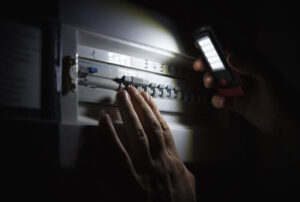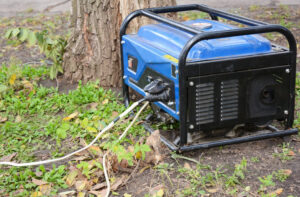A Grid Down Event Can Happen Any Time!
When you’re going about your daily life, you probably take electricity for granted. You leave lights on, use gadgets at your leisure, and never expect things to change for more than a quick flash during a thunderstorm.
But the reality is that many of us have been in situations where the grid went down for longer than a few seconds. People typically start to panic when it hits half an hour – so what would you do if the grid didn’t come back for days, weeks or even months?
You want to be fully prepared for the changes you and your family may have to endure. It would affect everything from having warm water to bathe in to cooking in the comfort of your kitchen, communicating with others and even seeing after the sun went down.
It can be physically demanding to live in a grid-down scenario, but it also has an impact on your mental health. By making preparations early on, you’ll be better able to handle some of the complications and get through it easier than if you were caught without the supplies and the vital knowledge that you need.
Understanding Grid Fragility and Its Impact on Your Life
We expect our electric grid to be there for us at all times, but as we’ve seen in the past, it’s not as secure as people may think. Transformers can go out locally, which can be repaired fairly quickly, but when something larger happens, it becomes more of a nightmare.
You have to think of all of the different things that could put the electric grid at risk. We primarily focus on natural disasters like blizzards, hurricanes, and other events. But it can also be a man-made threat such as a cyber-attack or a physical attack destroying vital infrastructure.
What you may not realize is just how much this is going to affect your life. When you’re focused on survival prepping, you’ll usually worry about having enough fresh water, because it is the most precious resource you will have.
If the grid goes down, and water supply plants are unable to treat the water to make it safe to drink, you may be without clean water for an extended period of time. If your tank can’t heat the water, you will be without warm water to bathe in.
In some homes, when the grid goes down, the water doesn’t even work at all – this would make it impossible for you to wash your dishes, take a bath, or even flush the toilet. In addition to the water supply being affected, you wouldn’t be able to simply turn on the stove or oven and prepare a warm meal, which includes warming something up quickly in a microwave.
Most transportation systems would come to a halt. You wouldn’t be able to fill your car with gas using an electric fuel pump, and public transportation would grind to a halt as well.
If you happen to have an EV (Electric vehicle) you would not be able to charge it once the battery is empty, which may render your EV useless as a way to get around. (However – some new EVs now allow for the vehicle battery to be fed back into the home – so this may potentially give you some immediate power to your home until the EV battery is empty as well).
If you were hospitalized, you might be able to get through a short-term event thanks to the backup generators they have, but it’s not meant to extend hospital operations for a long period of time. Everything would be affected, including your ability to take your debit card and swipe it at the grocery store.
You’d have to hope you had enough candles or solar lighting to give you a method to see by at night, and if temperatures were cold, you’d want to make sure that you could stay warm without being able to turn on the heat in your home.
Make an Audit of Your Current Level of Preparedness for No Electricity
To properly prepare for this type of survival situation, you want to assess what you currently have on hand and are capable of navigating in a grid down situation and where your preparations are lacking.
Think about where your dependency lies with electricity. For example, if you are in an extreme weather location, it may be vital that you can heat or cool your home when temperatures are at their highest or lowest point.
You want to also check if you have the ability to have a fire in your home safely, such as in a fireplace or wood-burning stove. You may have an elderly relative living in your home who requires some sort of electric medical assistance.
This can range from a simple CPAP machine that helps them with sleep apnea to something more dire. For example, diabetics have to keep their medication refrigerated, so you’d need to have an alternative for that purpose.
You probably rely heavily on your refrigerator and freezer to keep your food safe. You have to think about how you would handle your food in the fridge and freezer spoiling and if you have enough shelf stable food in jars and cans on hand to get you through a long-term grid down situation.
You also might rely on your smartphones and computers to communicate with others. If power was knocked out, how would you get in touch with rescue crews or even loved ones that you needed to communicate with?
Check out our report Part 10: Why You Need to Invest in Emergency Communication Gear for some great advice.
By auditing your ability to withstand a grid down event, you’ll be able to better prepare with the gadgets you need to survive in a world where you are used to modern luxuries and convenience, and you suddenly have none of those.
Have a Plan in Place for Extended Grid-Down Situations
It’s not really the short-term outages that you have to worry about, although it’s nice to have a plan in place to deal with those as well.
But – when the electricity goes out for a day or more, you have to expect that you might start facing hardships that you’re not used to.
You want to immediately develop a plan to keep your home secure, your food from spoiling, and everyone safe and comfortable within the shelter. Depending on what kind of power you have in your home, you may need to shut off your gas line if it’s a natural disaster situation.
Then, you want to consider your water supplies. If you have a bladder that can be filled up in your bathtub, use that to get a large supply of fresh water stored immediately. Then, take all other containers in your home and fill them with water.
If you are relying on a home security system, you want to make sure that you have backups in place so that your doors and windows are not being breached by any type of predatory individual.
Gather the supplies that you will need when the sun goes down or in the event that you lack electricity in general. You want to have one area where everything can be found, and make sure lamps and torches are laid out around the home.
Take time to secure your food supplies. This may mean putting some things on ice or going ahead and cooking meat over an open flame that may spoil if left without electricity.
Set up your generator if you have one, so that it’s ready to be used whenever you absolutely need it. If you are in an extreme weather location, such as the northeast, you want to reinforce your home to make sure it is not allowing cold weather in, and possibly even consider setting up a tent indoors so that your family can use body heat in an enclosed area to stay warm.
Make sure you also have a plan in place for how you want to communicate with others and let rescue teams know that you are without power, especially if there is a critical situation such as a medical need.
Practice for Grid-Down Events With Your Family and Give Everyone Jobs To Do in an Emergency
With your plans in place, you’ll want to begin practicing grid down events so that your family develops the mental strength that they’ll need to survive during a long period of time without electricity.
When they know what could happen and how to handle these events, it makes it easier when it a grid-down event actually happens. If there’s anything they need to practice, such as starting a fire to cook with, you want to make sure everyone knows how to do that so they’re not struggling in extreme survival events.
Make a list of the kind of equipment you want to have in your home for grid down situations. This will include basic needs such as shelf stable food, water, and solar gadgets and chargers as well as luxury items like a generator, and even comfort items like games, books, and ‘comfort’ food that’s not a necessity, but will boost morale.
If you’re stuck in a blizzard and temperatures are dropping, a treat like a warm cup of cocoa can hit the spot, and a board game can make everyone forget the situation they’re in for a while. Small children especially can get easily scared and will need some games to have them distracted.
Make sure you have enough supplies and that what you’re buying is durable. During these stressful times, you want your family to be able to cope with ease, and having the right preparations in place will help them tremendously.
Now that you’ve learned what to prepare for in a Grid-Down power outage it is time to move to the next report in our Survival Prepping 101 series Part 16: Securing Your Home is Vital to Your Survival
If you’ve missed Article 14 about How To Start and Maintain a Fire check it out by clicking on the link!



